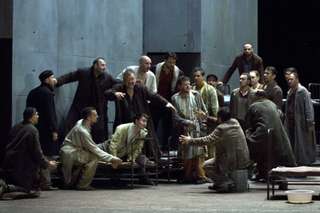|
Back
Fidelio It Is Not New York
Metropolitan Opera
11/12/2009 - & November 16, 21*, 24, 28, December 2, 5
Leos Janácek: From the House of the Dead
Willard White (Alexander Petrovich Gorianchikov), Eric Stoklossa (Alyeya), Stefan Margita (Filka Morozov, going under the name Luka Kuzmich), Peter Straka (The Tall Prisoner), Vladimir Chmelo (The Short Prisoner), Vladimir Ognovenko (The Prison Commandant), Heinz Zednik (The Old Prisoner), Kurt Streit (Skuratov), Jeffrey Wells (Chekunov), Adam Klein (Drunken Prisoner), Richard Bernstein (The Blacksmith), John Cheek (The Priest), Scott Scully (The Young Prisoner), Kelly Cae Hogan (Prostitute), Ales Jenis (Prisoner who plays Don Juan), Marian Pavlovic (Prisoner who plays Kedril), Peter Hoare (Shapkin), Peter Mattei (Shishkov), Andreas Conrad (Cherevin)
Metropolitan Opera Chorus, Donald Palumbo (Chorus Master), Metropolitan Opera Orchestra, Esa-Pekka Salonen (conductor)
Patrice Chéreau (director), Richard Peduzzi (set designer), Caroline de Vivaise (costume designer), Bertrand Couderc (lighting designer)

Czech composer Leos Janácek’s operas are mostly known for their strict verismo presentations of bleak tales of passion and murder drawn from local headlines. His last opera, From the House of the Dead, exceeds the usual grim realism of every day life by adapting a conventional literary work, Fedor Dostoevsky’s novel of the same name. A record of the Russian writer’s youthful imprisonment in a Siberian labor camp for involvement in an underground socialist group – a sentence he received after being treated to a mock execution – the work played a profound role in the development of his insights into the criminal mind, the nature of spirituality, and the importance of community.
Completed only a few weeks before Janácek’s death in 1928, From the House of the Dead premiered in Brno two years later. The opera shows a dramatic progression in the composer’s style. Abundant ostinato, driving percussion, and sharp dissonance meant to match the cruelty of the setting leave only a little room for the melodic music of Janácek’s earlier works. The action, a dramatic scaling down of Dostoevsky’s text, is concentrated into three short acts that in this production run unbroken for just over 90 minutes. Departing from conventional narrative plot, the opera is anchored by three stories of condemned criminals connected by demonstrations of the despair of prison life and apostrophes to the love and freedom that forever elude most of the characters. The murderers Skuratov and Shishkov have lamentable histories, but their powerful narratives and the soaring music that accompanies them remind us of Dostoevsky’s insistence that every human soul contains “a spark of God,” a quotation found on a piece of paper in Janácek’s pocket when he died. The nobleman Gorianchikov, a political prisoner whose crimes earn him greater than usual scorn in the prison, suffers tremendous abuse but ends the opera by regaining his freedom from the drunken prison commandant. His release causes a moment of jubilation before the other prisoners are sent back to work, but as prison narratives often tell us, it is such moments, however fleeting, that keep hope alive and ease the daily struggle against death, even if there is no general deliverance from tyranny, as Ludwig van Beethoven celebrated in his only opera, Fidelio.
Peter Gelb’s tenure as general manager has included determined efforts to recruit major music and theater personalities who have for one reason or another never worked at the Met. Patrice Chéreau, a prolific film and theater director who staged the controversial centennial production of Richard Wagner’s The Ring of the Nibelung at Bayreuth more than thirty years ago, makes his Met debut with this production. It is truly an international exhibition, having already appeared in Vienna and Amsterdam and now slated to be shared with the Aix-en-Provence opera festival and La Scala. Richard Peduzzi’s sets create an oppressive gray interior courtyard, but Chéreau fills it with dozens of choristers, silent actors, and even a few dancers to make the prison environment come alive in all its overcrowded ugliness. It was a bit unfortunate that he added a more than life-size model of a wounded eagle, which is nursed back to health by the prisoners in a subplot meant to draw out the opera’s theme of aspirations to liberty. The metaphor is beautiful, but the stage effect was silly. Throughout the opera, English subtitles are projected onto various walls to highlight the importance of the monologues (Janácek’s original libretto) and the opera’s heavily literal meanings. Caroline de Vivaise’s tattered costumes accentuate the plight of the prisoners in generic nineteenth century fashion.
This production also marks an important musical debut, that of Finnish conductor Esa-Pekka Salonen. Salonen’s expertise in modern music made him a natural choice, and his direction of the Met orchestra brought out its often unsung talent for twentieth century works. The opera’s ensemble cast excludes star solo performances, but the Met assembled some past and present heavyweights to contribute vocal power to the evening. Baritone Peter Mattei’s Shishkov, tenor Kurt Streit’s Skuratov, and baritone Willard White’s Gorianchikov delivered their essential parts with a stature and firmness that commanded all attention these singers receive when they appear in major traditional roles. Veteran bass Vladimir Ognovenko, a noted Boris Godunov among his general mastery of roles in the Russian lower register, devoted stentorian tones to the role of the prison commandant. John Cheek’s priest, Heinz Zednik’s old prisoner, and Peter Hoare’s Shapkin stood out as well. Janácek is not a household name in America, but this production will undoubtedly add to his increasing popularity everywhere it is performed.
Paul du Quenoy
|